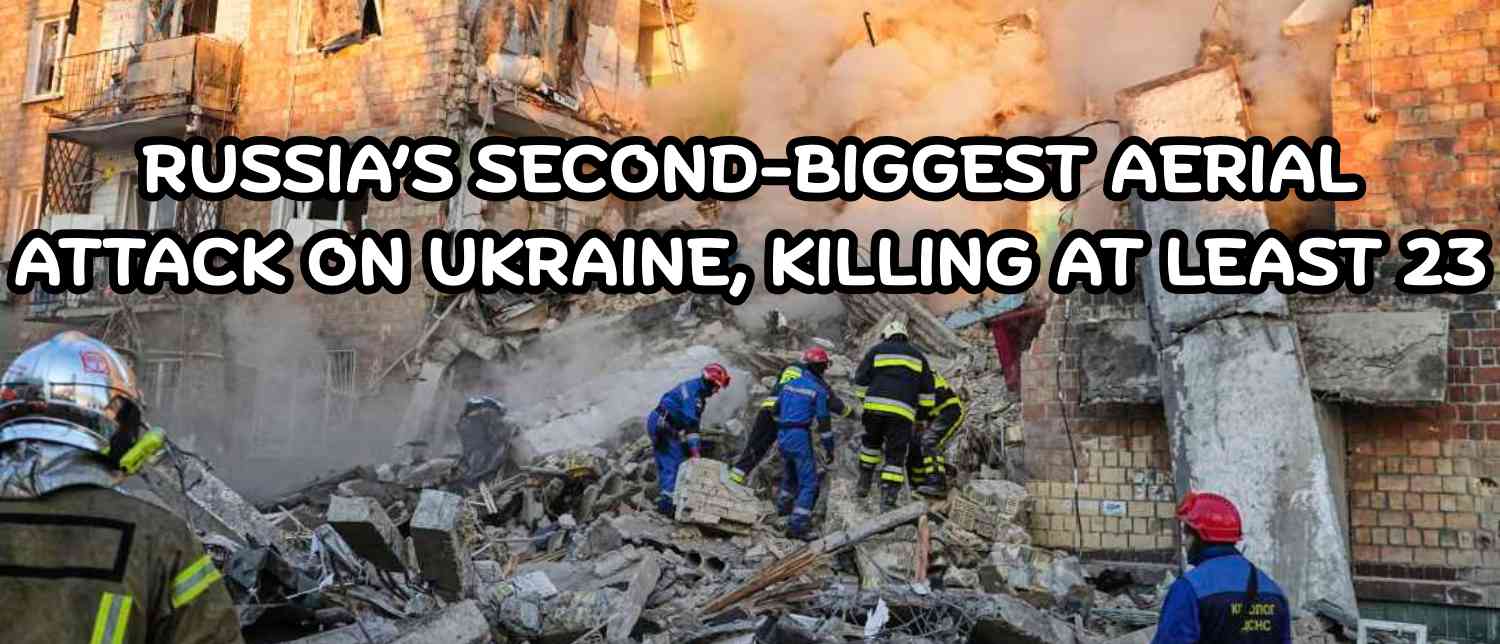In one of the most devastating assaults since the start of the full-scale invasion of Ukraine in February 2022, Russian forces launched a massive wave of airstrikes on Kyiv that killed at least 23 people, including four children, and inflicted severe damage on key international institutions. The deadly bombardment, which struck both residential neighborhoods and the offices of the British Council and the European Union (EU) delegation in the Ukrainian capital, has provoked a wave of condemnation across Europe and the United States.
The attack, described by analysts as the second-largest overnight barrage of the war, also highlighted the persistent challenges facing international diplomacy, even as U.S. President Donald Trump pushes for a ceasefire and renewed peace talks.
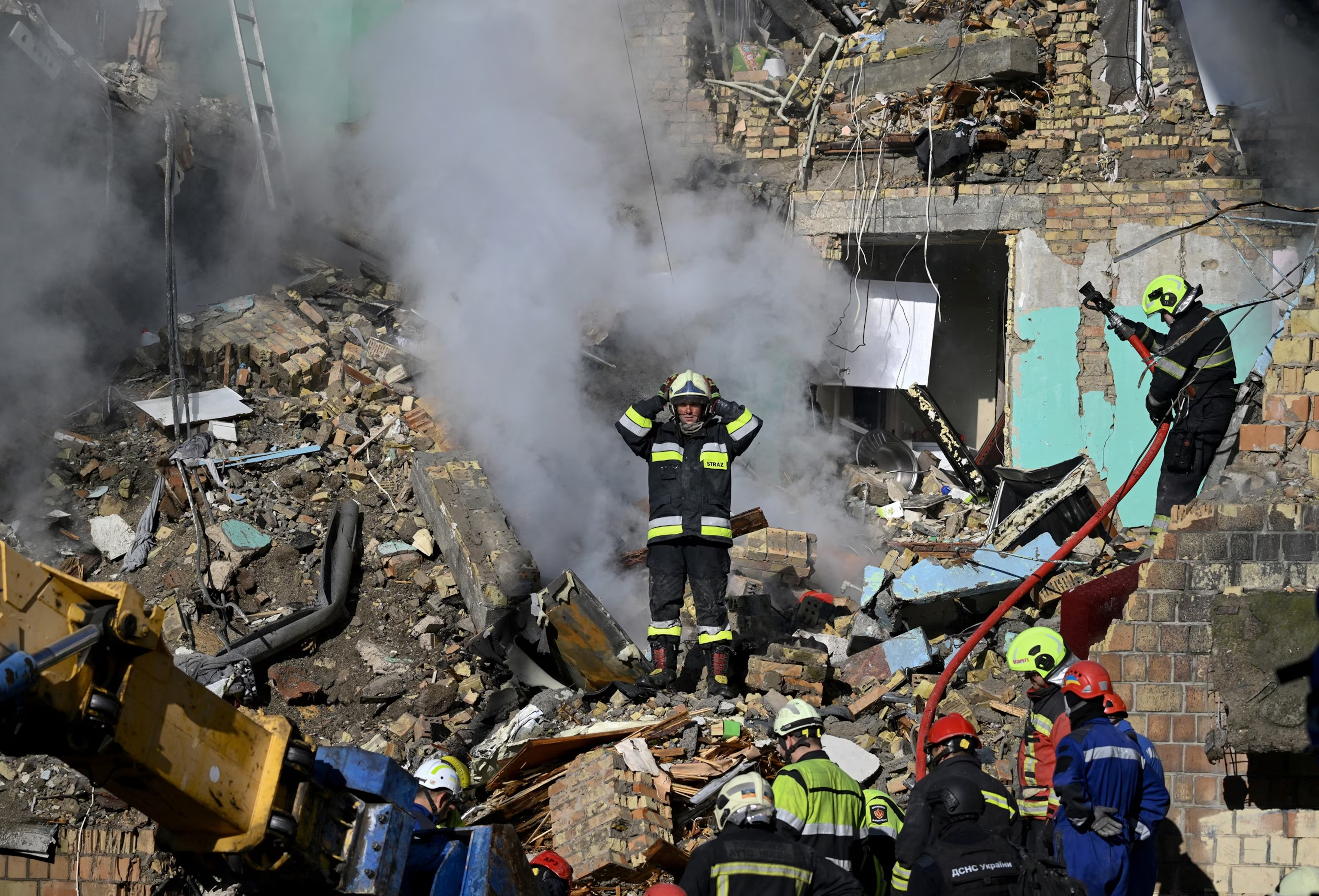
The Scale of Russia’s Deadly Strike
Ukraine’s Interior Minister, Ihor Klymenko, confirmed that the death toll from the overnight attack had risen to 23, with dozens more injured. The first strike hit a residential building in the eastern Darnytskyi district, killing several people, including four children. Hours later, a second blast struck Kyiv’s central Shevchenkivskyi district, claiming another life and damaging multiple structures, including cultural and diplomatic offices.
Ukraine’s Air Force reported that Russia launched 629 drones and missiles overnight, marking it as the second-largest single aerial assault of the war. According to AFP’s analysis of Kyiv’s official data, the scale of the bombardment was unprecedented in recent months and demonstrates Moscow’s continuing reliance on mass missile and drone strikes against urban centers.
The devastation left behind was visible in images circulating on social media and official outlets: shattered windows, collapsed ceilings, charred buildings, and debris-strewn streets in what were once bustling neighborhoods and diplomatic hubs.
Direct Hits on International Institutions
One of the most shocking aspects of the attack was the direct damage inflicted on international organizations operating in Kyiv.
-
The British Council office suffered extensive destruction, with its entrance and windows blown out by the blast. Photographs showed piles of glass and debris surrounding the building, while the interiors revealed collapsed ceiling panels and smashed doors.
-
The EU delegation offices were also heavily damaged. According to Katarína Mathernová, the EU ambassador to Ukraine, the premises were “severely damaged by the shock wave” from the strike.
These targeted hits on European institutions sparked immediate diplomatic retaliation from both London and Brussels.
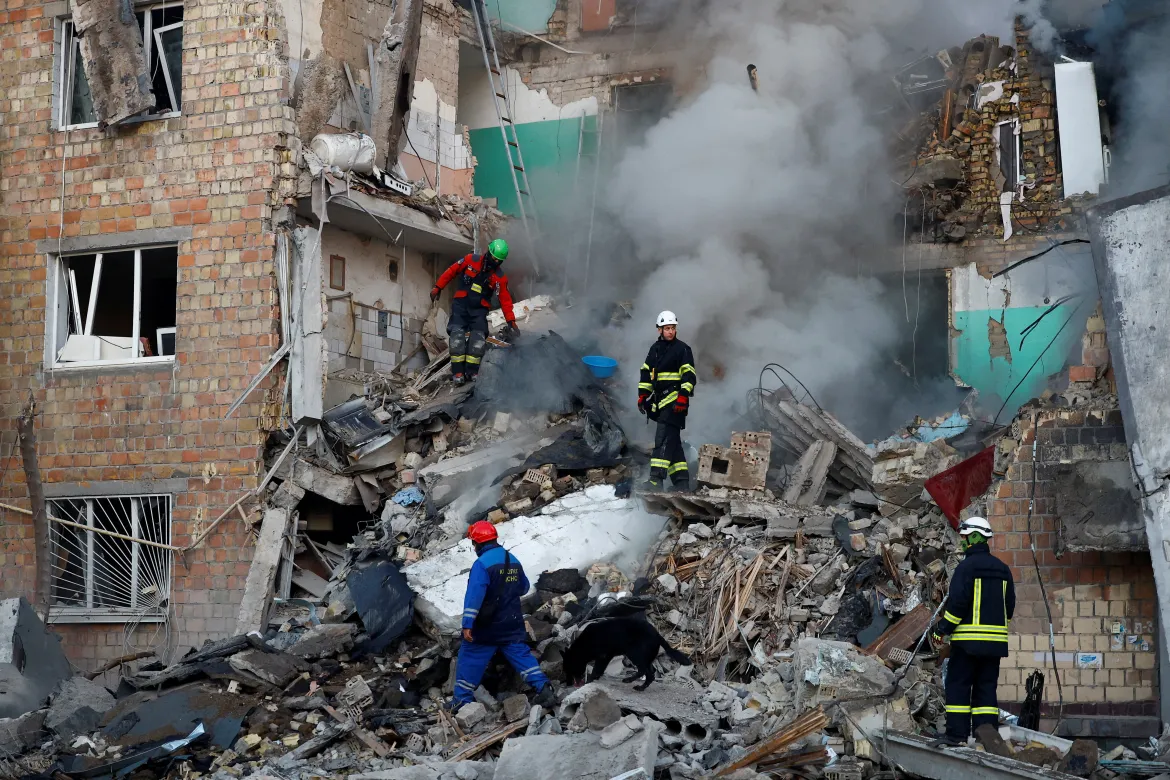
EU and UK Summon Russian Envoys
In response to the strikes, the United Kingdom and the European Union summoned Russian envoys for urgent discussions. A source within the UK government told The Guardian that the Foreign Office acted swiftly to confront Moscow over the damage to the British Council.
British Foreign Secretary David Lammy issued a strong statement condemning the attacks:
“Putin’s strikes last night killed civilians, destroyed homes, and damaged buildings, including the British Council and EU Delegation in Kyiv.”
British Prime Minister Keir Starmer echoed Lammy’s outrage, accusing Russia of deliberately undermining peace efforts and pointing out that children were among the dead.
In Brussels, European Commission President Ursula von der Leyen said the bombardment proved the Kremlin would “stop at nothing to terrorize Ukraine.” She also announced that the EU would pursue fresh sanctions against Russia.
Meanwhile, Italian Prime Minister Giorgia Meloni declared that the strikes demonstrated Moscow’s lack of interest in peace negotiations, reinforcing Europe’s increasingly hardline stance.
U.S. Reaction: Trump’s Response to the Kyiv Attacks
Across the Atlantic, the response from Washington was notable but cautious. According to his press secretary Karoline Leavitt, U.S. President Donald Trump was “unhappy but not surprised” by the overnight barrage.
Leavitt explained that the president viewed the attacks as part of the long-running war between Russia and Ukraine, remarking:
“Both countries have been at war for a very long time.”
Trump’s special envoy for Ukraine, Keith Kellogg, went further, warning that these “egregious attacks threaten the peace that [Trump] is pursuing.” Kellogg emphasized that the missile and drone strikes not only endangered civilians but also directly undermined U.S. diplomatic efforts to bring the conflict to an end.
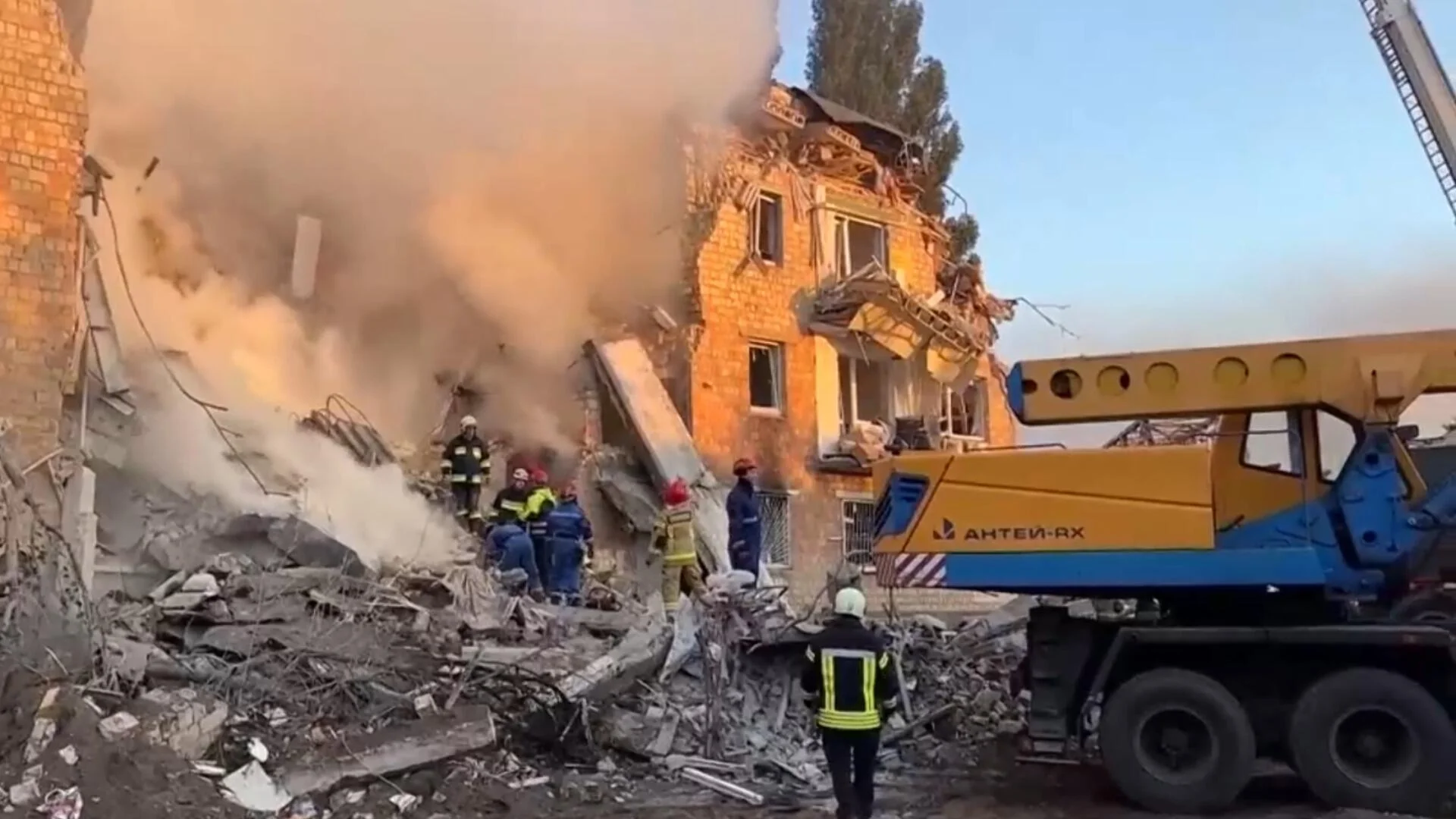
The White House’s Push for Diplomacy
While condemning the strikes, Trump’s administration reiterated its focus on diplomacy. Leavitt stressed that the president remained committed to a negotiated settlement but suggested that neither Moscow nor Kyiv currently appeared willing to compromise.
She told reporters that while the U.S. could encourage peace talks, the ultimate decision “rests with the leaders of the two countries.” Kellogg echoed this sentiment in a social media post, warning that Moscow’s latest escalation jeopardized fragile peace initiatives.
Trump, who has often repeated his claim that he could resolve the Ukraine war “within 24 hours” if given the chance, has recently found his peace efforts hitting obstacles.
Trump’s Peace Bid: A Diplomatic Deadlock
Earlier this year, Trump met Russian President Vladimir Putin in Alaska and later held talks with Ukrainian President Volodymyr Zelenskyy in Washington. Despite the high-profile meetings, no breakthrough was achieved.
Attempts to organize a direct summit between Zelenskyy and Putin have since faltered, with German Chancellor Friedrich Merz stating there would “obviously” be no such meeting under current conditions.
The recent escalation underscores the difficulty of achieving Trump’s stated goal of rapidly ending the war. With Russia intensifying its strikes and Ukraine bracing for further assaults, the gap between both sides’ demands appears wider than ever.
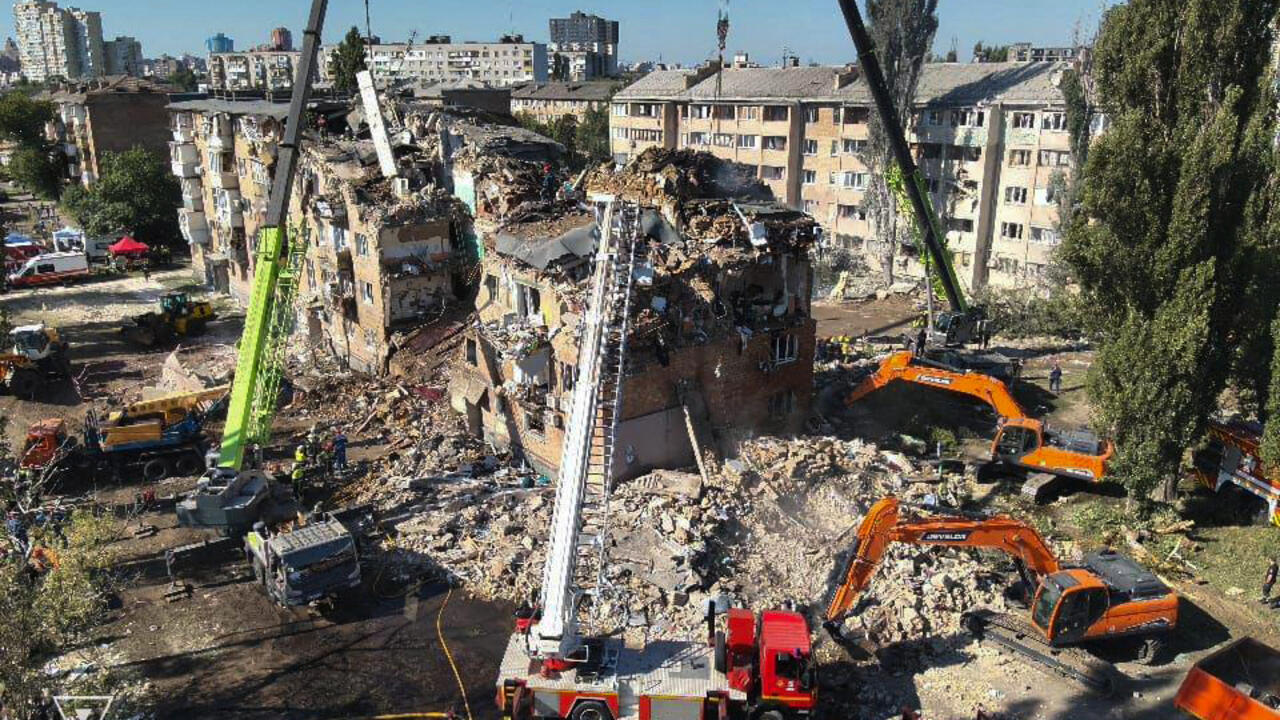
Ukraine’s Response: Zelenskyy Condemns Russia’s “Missiles Over Dialogue”
Ukrainian President Volodymyr Zelenskyy condemned the strikes, describing them as a “clear response” to international calls for a ceasefire. According to Zelenskyy, Moscow’s decision to unleash such a massive barrage was proof that Russia has “no interest in diplomacy, only in destruction.”
The Ukrainian leader argued that the ferocity of the attack was intended not only to terrorize civilians but also to send a message to the international community that Russia would not bow to external pressure for negotiations.
Fallout in Europe: Growing Unity Against Russia
The latest strikes have reinforced European unity against Moscow. While European nations have at times differed on the pace and scope of support for Ukraine, the attack on Kyiv—and the destruction of EU offices—has galvanized opinion.
-
Von der Leyen vowed tougher sanctions.
-
Mathernová confirmed extensive damage to EU property, further angering European officials.
-
Meloni and other European leaders pointed out that Russia’s aggression undermines any possibility of meaningful talks.
The attack has also renewed discussions within NATO about bolstering Kyiv’s air defense systems, as over 600 missiles and drones in a single night overwhelmed Ukrainian defenses, leaving many areas exposed.
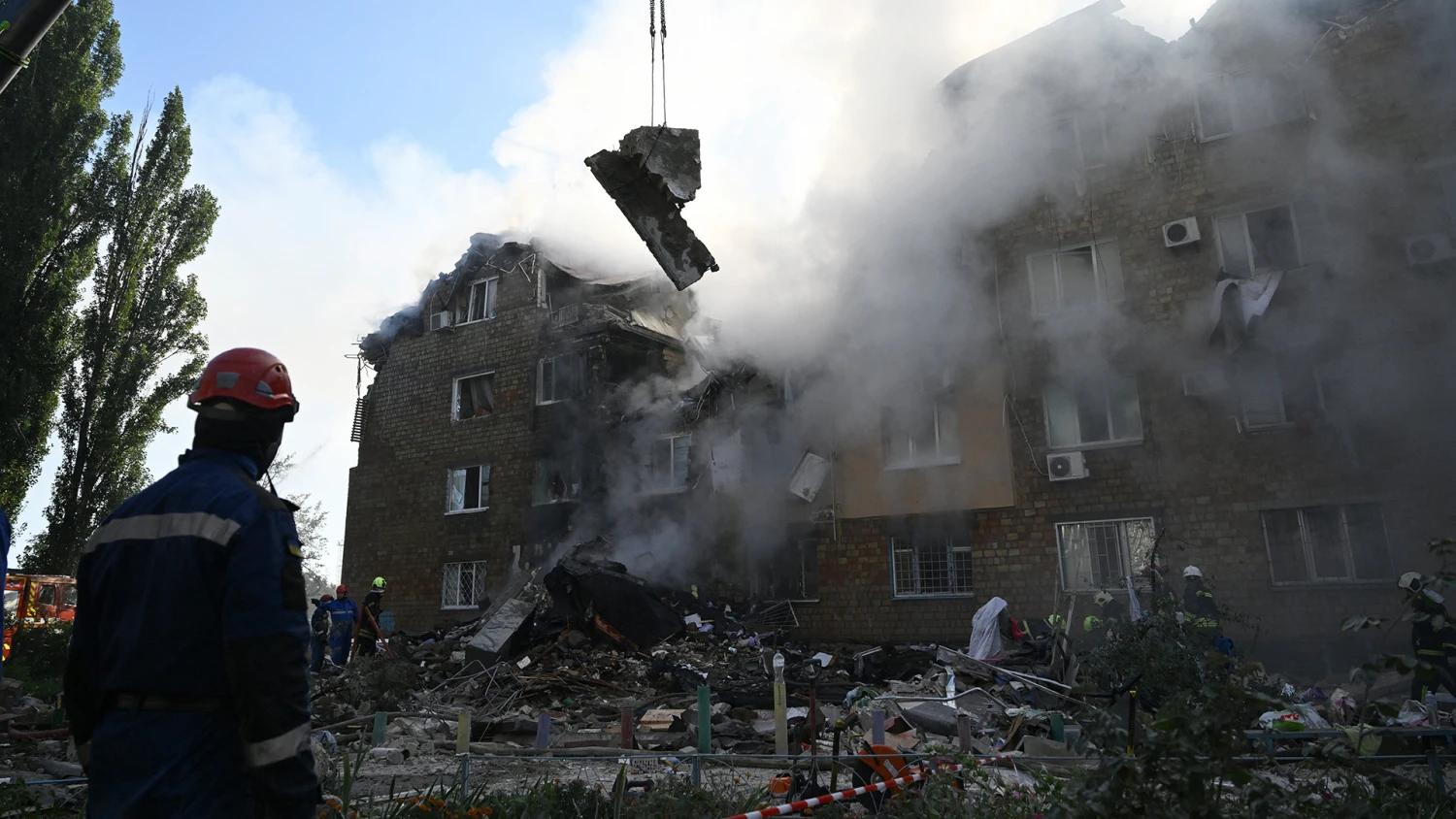
Russia’s Strategy: Relentless Strikes Despite Diplomacy
The scale and timing of the assault raise questions about Moscow’s intentions. While Russian officials continue to talk about the importance of negotiations, their military actions suggest a commitment to escalating pressure on Ukraine’s cities.
Analysts argue that the strikes were not just about targeting military infrastructure but also about undermining morale, destroying civilian life, and weakening international institutions within Ukraine.
By hitting the British Council and EU delegation, Russia appears to be sending a symbolic warning to Kyiv’s international allies that they too are vulnerable in this conflict.
Can Peace Be Achieved?
With mounting civilian casualties, international institutions damaged, and global outrage intensifying, the prospect of near-term peace looks increasingly remote. Trump’s efforts to broker a settlement face enormous obstacles, not least because neither side appears willing to make concessions.
As Kellogg warned, Russia’s latest actions “threaten the peace” and risk collapsing fragile diplomatic initiatives. For Ukraine, the priority remains strengthening defenses and rallying international support, while for Russia, the focus seems firmly on demonstrating its ability to strike at the heart of Kyiv.
For the international community, the latest attack is a sobering reminder of the human cost of the war and the difficulty of pursuing diplomacy in the face of relentless violence.
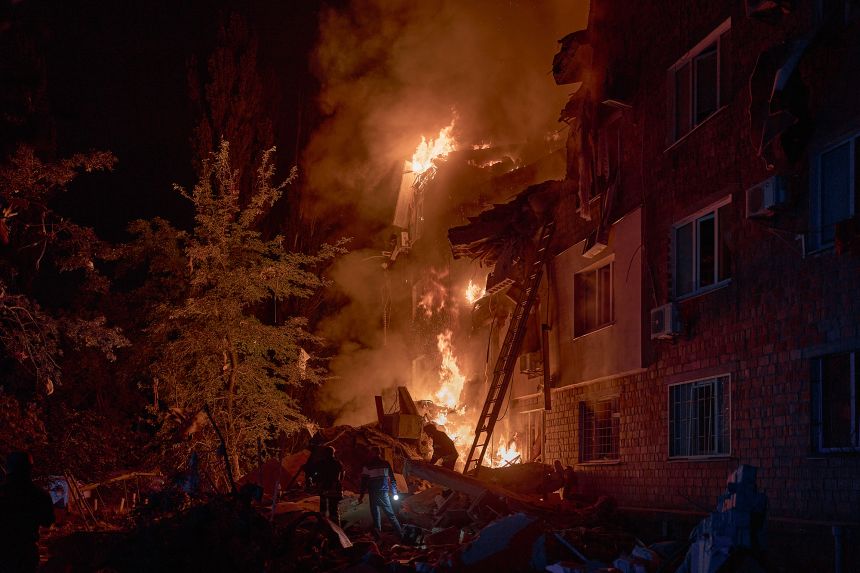
The Road Ahead
The deadly strikes on Kyiv, which killed 23 people including four children, represent one of the darkest nights in Ukraine since Russia’s invasion began. The damage to the British Council and EU offices has transformed the assault from a national tragedy into an international crisis, provoking widespread condemnation and swift diplomatic action.
While the EU and UK summoned Russian envoys and vowed consequences, the U.S. emphasized diplomacy under Trump’s leadership. Yet, with over 600 missiles and drones raining down on Kyiv in a single night, peace feels further away than ever.
As Ukraine buries its dead and counts the cost of the destruction, one truth stands clear: Russia’s war is not only a battle on the ground but also a test of international resolve, diplomacy, and humanity itself.
With inputs from agencies
Image Source: Multiple agencies
© Copyright 2025. All Rights Reserved. Powered by Vygr Media.

